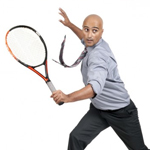 The challenge of unrealised potential has always resonated with me.
The challenge of unrealised potential has always resonated with me.
Probably because in most respects I could do a lot better.
My 10th grade history report summed it up nicely.
“I believe Zachary is underachieving in this subject.”
And I had scored the second highest grade you could get. I didn’t try in high school and did very well. Top 15% in the country in my year level doing about 20% of the work of the highest achievers in my school.
Everyone thought I would be good at sales. I wasn’t, at first but I am got better.
There I was meditating on the Tennis. I was watching the Wawrinka V Djokovic semi final at the Australian open.
It was apparent that the game was being played entirely between Wawrinka’s ears. Novak was essentially irrelevant to the outcome. He may be the number 2 player in the world but as far as I could see there was no way known to man that he could actually affect the game unless he could affect what was happening in Wawrinka’s head. (The same happened in the final until Nadal got hurt. Nadal was irrelevant to the outcome – until Wawrinka let him be relevant.)
The tennis talent had almost nothing to do with it. Unless in 12 months Wawrinka got 10X better at playing tennis.
There was a gap between what Wawrinka was capable of and what he allowed himself to do. To me that is the art of being a winner. Winners are genuinely able to extract everything they can from themselves. Lleyton Hewitt is a prime example of what you can achieve with modest assets and doing the work to get everything you can out of yourself.
Wawrinka in his late 20’s was slipping the other way. Retirement and unrealised potential. What could he have been if he had only learned how to maximise his talents and also win tennis games?
I’ve realised that winning in and of itself is a separate and unrelated field to the playing the game. Playing is the price of admission. Excelling at something requires that you are able to play the game and you know the art of winning.
The art of winning/being successful is universal – master winning at one thing and you will be able to transfer it to any other endeavour.
Miymoto Musashi put it best in the Book of 5 Rings, “The principle of strategy is having one thing, to know ten thousand things.”